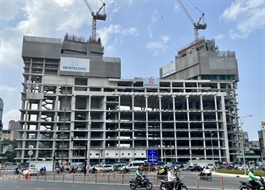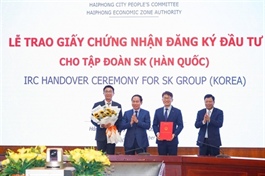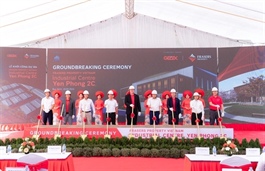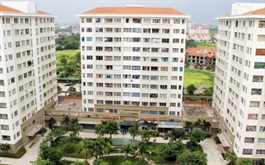Hopes rise for light in real estate fortunes
Hopes rise for light in real estate fortunes
Real estate observers are predicting that difficulties in the market will ease in the last months of the year thanks to proactive interventions from the government, interest rates gradually decreasing, and reduced pressure on corporate bonds.

At an event held in the southern province of Ba Ria-Vung Tau on September 11, Minister of Construction Nguyen Thanh Nghi insisted that the real estate market would gradually warm up in the last months of this year and resume development again in 2024.
“Moves to resolve problems for real estate projects are beginning to have positive results and hundreds of delayed projects have been resolved to ensure supply and promote the market,” Nghi said.
According to Barry Weisblatt, director of Analysis of VNDirect Securities, although liquidity risks in the real estate market remain high, the most difficult period has passed. Liquidity coefficients slightly improved in Q2 and Q3.
“In comparison with 2011-2013 when the real estate market was in a downturn, current real estate businesses have much better financial health with the lower leverage ratio. The quick payment ratio of businesses in the current period is also healthier and the ability to pay interest is better,” Weisblatt said.
In recent months, with the participation and support of the government and management agencies, many businesses have proactively bought back corporate bonds worth VND12.5 trillion ($523 million) ahead of maturity, helping the bond value to mature and easing the status of real estate businesses that are having difficulty with cash flow.
The pressure on interest costs of real estate development businesses has also been somewhat cooled by loosening monetary policy.
However, according to Weisblatt, the actual average lending interest rate for the real estate sector is still high at 13-14 per cent a year. “I expect that the real estate market will gradually heat up again when home loan interest rates decrease to 10-11 per cent,” he added.
The liquidity of real estate businesses is still a worrying issue as many businesses are still slow to pay interest and principals on bonds due to difficulties in refinancing channels, along with a sharp decline in sales due to market psychology.
Meanwhile, the Law on Land is being implemented on schedule and is set to take effect in the second half of 2024, marking a major turning point for the real estate sector when bottlenecks are resolved in approving new residential projects, helping the housing supply gradually recover towards 2025.
In addition, the socioeconomic situation has changed positively in recent months. The State Bank of Vietnam has reduced operating interest rates four times, with a total reduction of 0.5-2 per cent per year. Market interest rates are decreasing, bringing real estate businesses easier access to capital, so people may gradually turn their interest to real estate investment channels.
Over the past few months, a number of projects across the country have made preparations for offerings and sales, and trading centres are also preparing to operate again after many months of closure.
For example, transaction centre OneHousing has been continuously holding recruitment events to expand its professional brokerage staff. This company estimates to increase its brokerage force to reach 1,000 sales by the end of 2023. Its target is to reach up to 10,000 sales nationwide in 2024.
Meanwhile, many developers have also confidently planned or launched sales, and at the same time, implemented a series of stimulus programmes such as increasing discounts, extending payment schedules, and supporting interest rates for home buyers.
For example, Masteri Waterfront, Zenpark, and The Zurich have applied a zero interest rate support policy for 2-8 years to support customers’ financial situation. Ecopark offers a 10 per cent discount for customers who buy at Eco Village Saigon River when paying for 95 per cent of the house value, or supporting bank loan interest rates and principal debt grace for 30 months.
In addition, the market has also recognised aggressiveness in implementing the sales policies of many investors.
A OneMount survey notes that in the second quarter of 2023, about 30 per cent of projects increased incentive policies with the value of gifts equivalent to 7.7 per cent of the selling price. After applying this sales policy, the consumption of these projects increased by 67 per cent compared to the previous quarter.
New open supply in the second quarter also increased by over 150 per cent, while consumption was about 15 per cent higher compared to the previous quarter, the survey indicated.




























